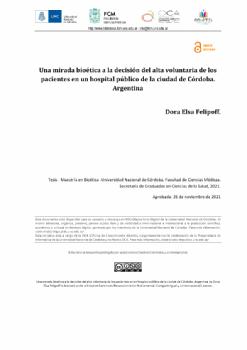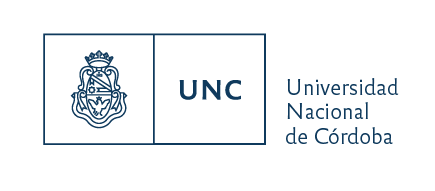| dc.contributor.advisor | Maders, Iris Alicia | |
| dc.contributor.author | Felipoff, Dora Elsa | |
| dc.date.accessioned | 2022-11-17T18:19:11Z | |
| dc.date.issued | 2021-11-26 | |
| dc.identifier.uri | http://hdl.handle.net/11086/29718 | |
| dc.description | Tesis - Maestría en Bioética - Universidad Nacional de Córdoba. Facultad de Ciencias Médicas. Secretaría de Graduados en Ciencias de la Salud, 2021 | es |
| dc.description | 49 p. | |
| dc.description.abstract | El alta hospitalaria es un acto privativo del médico, pero en la actualidad es una realidad la solicitud del alta en contra de la indicación médica o alta voluntaria por parte del paciente. Este trabajo parte de la necesidad de conocer cuáles son las razones que motivan la solicitud del alta voluntaria. Para ello, se entrevistaron a los pacientes internados en el Hospital Córdoba entre enero y diciembre del año 2020 que solicitaron el alta voluntaria. Algunos pacientes manifestaron razones personales, pero la mayoría la solicitó por situaciones percibidas como hechos de violencia institucional en el contexto de la internación. A partir de estos resultados se puede afirmar que la mayor apuesta es la visibilización de la violencia en el ámbito de la salud para lograr una transformación del sistema a través de una acción colectiva.
Hospital discharge is a private act of the doctor, but at present the request for discharge against the medical indication or voluntary discharge by the patient is a reality. This work is based on the need to know what are the reasons that motivate the request for voluntary discharge. To do this, patients admitted to Hospital Córdoba between January and December 2020 who requested voluntary discharge were interviewed. Some patients expressed personal reasons, but the majority requested it for situations perceived as acts of institutional violence in the context of hospitalization. Based on these results, it can be affirmed that the greatest bet is the visibility of violence in the health field to achieve a transformation of the system through collective action. | es |
| dc.description.abstract | Hospital discharge is a private act of the doctor, but at present the request for discharge against the medical indication or voluntary discharge by the patient is a reality. This work is based on the need to know what are the reasons that motivate the request for voluntary discharge. To do this, patients admitted to Hospital Córdoba between January and December 2020 who requested voluntary discharge were interviewed. Some patients expressed personal reasons, but the majority requested it for situations perceived as acts of institutional violence in the context of hospitalization. Based on these results, it can be affirmed that the greatest bet is the visibility of violence in the health field to achieve a transformation of the system through collective action. | en |
| dc.language.iso | spa | es |
| dc.rights | Atribución-NoComercial-CompartirIgual 4.0 Internacional | * |
| dc.rights.uri | http://creativecommons.org/licenses/by-nc-sa/4.0/ | * |
| dc.subject | Alta de paciente | es |
| dc.subject | Relaciones médico-paciente | es |
| dc.subject | Discusiones bioéticas | es |
| dc.subject | Bioética | es |
| dc.subject | Violencia institucional | es |
| dc.subject | Autonomía | es |
| dc.title | Una mirada bioética a la decisión del alta voluntaria de los pacientes en un hospital público de la Ciudad de Córdoba, Argentina | es |
| dc.type | masterThesis | es |
| dc.description.embargo | 2023-11-26 | |
| dc.description.fil | Fil: Felipoff, Dora Elsa. Provincia de Córdoba. Hospital Córdoba; Argentina. | es |





